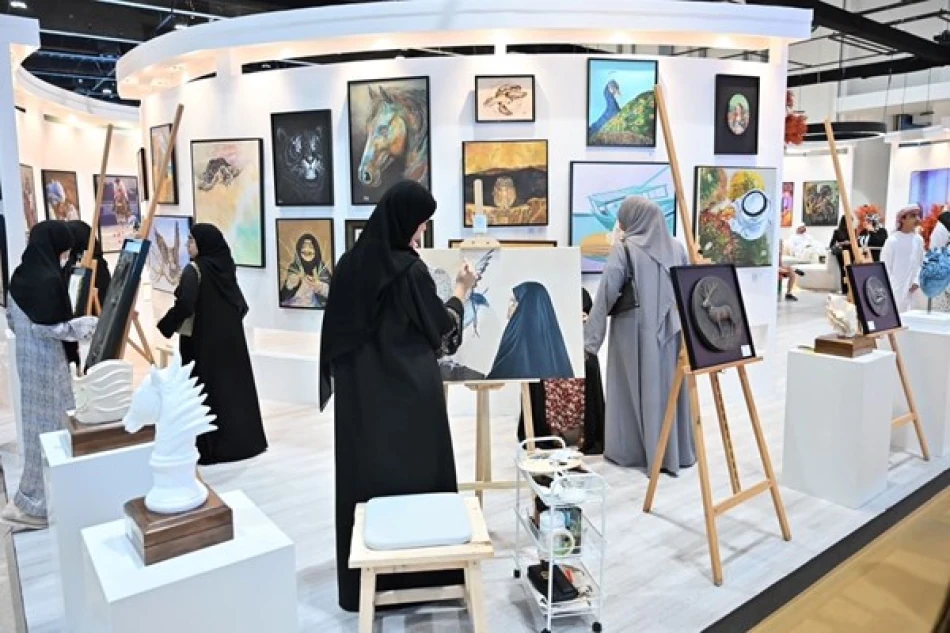
Emirati Women Driving the Nation's Cultural and Heritage Initiatives
UAE Women Emerge as Cultural Guardians, Transforming Heritage Preservation into Economic Opportunity
The United Arab Emirates is positioning women at the forefront of cultural preservation through a comprehensive strategy that goes beyond traditional roles, transforming them into active creators and economic beneficiaries of heritage conservation. This approach represents a significant shift from passive guardianship to dynamic cultural entrepreneurship, setting a regional benchmark for heritage-driven economic empowerment.
Strategic Government Framework Powers Women's Cultural Leadership
Under President Sheikh Mohammed bin Zayed Al Nahyan's leadership, the UAE has established an integrated policy framework spanning multiple government entities. The Ministry of Community Development, General Women's Union, and UAE Gender Balance Council have created synergistic programs that position women not merely as heritage preservers, but as cultural innovators capable of bridging traditional knowledge with contemporary markets.
This institutional approach mirrors successful cultural preservation models seen in Singapore and South Korea, where government-backed heritage programs have generated significant economic returns while maintaining cultural authenticity.
Digital Transformation of Traditional Crafts
The Ministry of Culture and Youth has launched digital platforms including the Creative Industries Portal and Electronic Cultural Market, enabling women to commercialize traditional products both locally and internationally. This digitization strategy addresses a critical gap that has historically limited artisans to local markets, potentially expanding their reach to global heritage enthusiasts and collectors.
Economic Empowerment Through Heritage: The "Al-San'a" Model
The Ministry of Community Development's "Al-San'a" project represents a paradigm shift in heritage preservation economics. By providing financial and technical support to women producers, the initiative transforms traditional crafts from cultural obligations into sustainable income sources. This model addresses unemployment concerns while preserving cultural knowledge—a dual benefit that economic development experts increasingly recognize as essential for sustainable growth.
Dr. Amal Hamid Balhoul, a psychological specialist and anthropology researcher, emphasizes that the UAE's approach represents a strategic recognition that women's empowerment in heritage preservation extends beyond gender equity to become a cornerstone for cultural identity sustainability.
International Market Positioning and Cultural Diplomacy
The UAE's strategy extends beyond domestic preservation to international cultural diplomacy. Women artisans now represent Emirati heritage at prestigious global events including Turkey's Traditional Industries Festival, Morocco's Tantan Cultural Season, and Italy's International Folklore Festival. This international presence positions the UAE as a cultural bridge between traditional Arab heritage and global appreciation for authentic craftsmanship.
Competitive Advantage in Cultural Tourism
Mona bin Shaiban Al Muhairi, director of the Heritage Al-Qattara Market, notes that supporting women in heritage fields has evolved from choice to national necessity. This perspective aligns with global trends where cultural tourism increasingly drives economic growth—the UAE appears positioned to capitalize on this trend through its women-centered approach.
Generational Knowledge Transfer: Securing Cultural Continuity
Programs like "Heritage in Schools" and "National Identity" demonstrate sophisticated understanding of cultural transmission challenges. By engaging women as workshop leaders and heritage educators, the UAE addresses the critical risk of knowledge loss that threatens many traditional societies globally.
Fatima Ahmed Obaid Al-Mughni, a women's rights activist, observes that Emirati women have transcended mere heritage preservation to become active shapers of its future—a transformation enabled by comprehensive government support.
Investment Implications and Market Potential
This comprehensive approach to women-led heritage preservation creates multiple investment opportunities. The digitization of traditional crafts, international market expansion, and integration with cultural tourism suggest emerging sectors for both domestic and international investors interested in sustainable cultural enterprises.
The UAE's model demonstrates how cultural preservation can generate economic returns while maintaining authenticity—a balance that many heritage-rich nations struggle to achieve. As global interest in authentic cultural experiences continues growing, the UAE's women-centered approach positions the country advantageously in the expanding cultural economy.
Regional Leadership in Cultural Innovation
By transforming women from passive tradition keepers into active cultural entrepreneurs, the UAE establishes itself as a regional leader in heritage innovation. This approach offers a replicable model for other Gulf states seeking to diversify their economies while preserving cultural identity—a critical balance as these nations navigate post-oil economic transitions.
The success of this initiative will likely influence regional cultural policies and could establish the UAE as a hub for heritage-based entrepreneurship, attracting cultural practitioners and investors from across the Arab world and beyond.
Most Viewed News

 Layla Al Mansoori
Layla Al Mansoori






